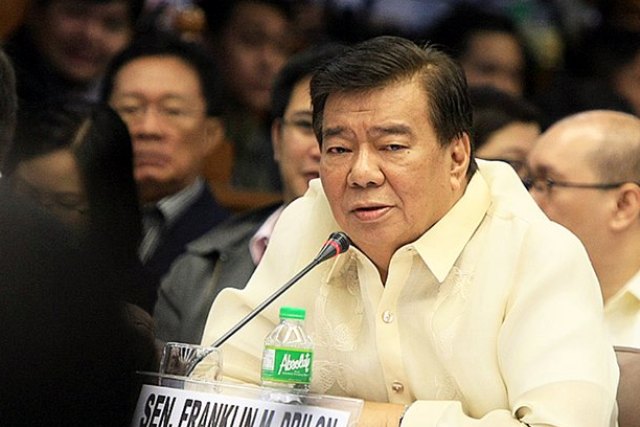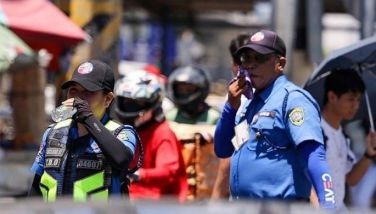Palace warned vs new martial law proclamation

Malacañang would be circumventing the Constitution if it issues a new martial law proclamation for Mindanao without going through Congress, Senate Minority Leader Franklin Drilon said yesterday. Senate PRIB/File
MANILA, Philippines - Malacañang would be circumventing the Constitution if it issues a new martial law proclamation for Mindanao without going through Congress, Senate Minority Leader Franklin Drilon said yesterday.
In a statement, Drilon said that any advice for President Duterte to just issue a new proclamation if Congress does not approve an extension of martial law “is an affront to the Constitution.”
Last Wednesday, chief presidential legal counsel Salvador Panelo said Duterte might consider issuing a new martial law proclamation instead of getting Congress approval for a new one.
“If Congress does not extend on the 60th day upon initiative of the President then there can be no extension. Another proclamation is necessary,” Panelo said.
President Duterte’s martial law declaration in Mindanao issued last month expires on July 22. The declaration – contained in Proclamation 216 – was in response to the seizure of Marawi City by Maute terrorists who claimed to have links to the Middle East-based Islamic State (IS).
“Such action will be a circumvention of the Constitution because for all intents and purposes, it is nothing… but an extension of the existing proclamation,” Drilon said.
“You cannot circumvent the Constitution. Huwag naman sana nating lokohin ang taumbayan (Let’s not fool the people). Let us not try to go around the constitutional requirements. Let us respect the process,” he added.
Drilon emphasized that only Congress has the power to extend martial law, if the President so recommends.
The senator suggested that the President signify his intention to extend martial law before July 22.
“To avoid any question, the President should advise Congress that it is his intention to extend martial law,” he said.
“Now, on July 24 Congress will be in joint session for the SONA (State of the Nation Address). My suggestion is that instead of adjourning after the SONA, we continue the joint session in order to work on the request of the President for an extension of martial law, for Congress to decide on it,” he added.
Under Article VII, Section 18 of the Constitution, Drilon noted that “upon the initiative of the President, the Congress may, in the same manner, extend such proclamation or suspension for a period to be determined by the Congress, if the invasion or rebellion shall persist and public safety requires it.”
Such provision, Drilon explained, was included in the Constitution to prevent possible abuses in the exercise of the power to declare martial law, as what took place during the Marcos regime.
“What cannot be done directly cannot be done indirectly. Doing this would violate the principle of check and balance between the executive and Congress,” he said.
The document was submitted to Congress for its perusal and in spite of the position taken by several legislators that a joint session should be held to discuss this, no further action was taken by the Senate and the House of Representatives.
Allies of the President argued that the Constitution only requires Congress to hold a joint session to take up the extension of martial law.
However, critics of the administration pointed out that it is the duty of Congress to hold a joint session to take up the martial law declaration so that the public would know what it entails and the reasons for its imposition.
‘Serious errors’
With only a few days left before the expiration of Proclamation 216, opposition congressmen are set to appeal a Supreme Court (SC) majority decision upholding the legality of martial law in Mindanao.
“Serious errors in the majority decision will be exposed and expounded in the motion for reconsideration,” Albay Rep. Edcel Lagman said yesterday.
He said the Constitution’s empowering the SC to review the basis for the imposition of martial law is one of the safeguards against abuses or recurrence of a Marcos-era type martial rule.
“This safeguard was denigrated by the majority decision which effectively deferred to the discretion of the President and gave him ‘much leeway and flexibility’ to declare martial law because it is he who has the arsenal of intelligence information to warrant such declaration,” he said.
Lagman criticized the majority decision for restating what the Constitution says: that the President may declare martial law in the entire country or any part of it.
“This was completely unnecessary other than to further embolden the President to place the entire country under martial law,” he pointed out.
He said contrary to the position of the SC majority, information presented by Duterte to Congress did not contain proof of actual rebellion in Marawi City that could have justified martial law.
“If the facts reported to the President are not accurate, then the sufficiency of the factual basis is eroded,” Lagman said.
Earlier, he said he and his colleagues were not inclined to file a motion for reconsideration because the 11 justices who supported martial law “may not change their stance in favor of President Duterte.”
He had stressed the “prevailing facts” in Marawi City on May 23 when martial law was proclaimed were not enough justification for such proclamation, as the military itself had emphasized that it was in control of the events that unfolded after its attempt to arrest terrorist leader Isnilon Hapilon.
“The crucial issue is whether there was sufficient factual basis for the President’s finding that actual rebellion existed in Marawi City and the rest of Mindanao on May 23, 2017 when Proclamation No. 216 was issued,” he stressed.
He said the raising of the IS flag in Marawi City and the terrorists’ claim that they were out to establish a caliphate in Mindanao did not constitute actual rebellion.
“To believe that the objective of the Maute and Abu Sayyaf groups is to establish a wilayah (IS province) in Marawi or Mindanao as part of the ISIS caliphate is to succumb to terrorist propaganda and propel these local terror groups to the world stage,” Lagman maintained.
“Except for the drumbeating say-so of the terrorist leaders, there is no evidentiary mooring for this bare propaganda,” he said.
Post-May 23 facts
Lagman surmised that in supporting Duterte’s martial law, the 11 SC justices might have considered the events after May 23, like the deaths on both sides and on the civilian population, and the destruction caused by the battle of Marawi.
“The high court must have been overwhelmed by the horrific and tragic aftermath of the declaration of martial law and suspension of the writ of habeas corpus which made the majority of the justices oblivious that the current escalating deaths, destruction and displacement of civilians were not the prevailing facts on May 23, 2017 when Proclamation No. 216 was issued,” he said.
The deaths, destruction and dislocation of civilians are the aftermath of Duterte’s proclamation and should not have been considered as facts when martial law was imposed, he said.
He added that he and his opposition colleagues “fully appreciate the separate dissents of Chief Justice Ma. Lourdes Sereno, Senior Associate Justice Antonio Carpio and Associate Justice Alfredo Caguioa who limited the coverage of martial law to Marawi City, and Associate Justice Marvic Leonen who voted to void Proclamation No. 216 in its entirety.”
The militant Bagong Alyansang Makabayan (Bayan) said that with the SC decision, the Duterte administration is now in a better position to implement repressive policies.
“President Duterte now has the support of the Supreme Court as well as the US government. Martial law provides the legal basis for escalating repression against the people, militarization of communities and violations of civil and political rights,” Bayan secretary-general Renato Reyes said.
“Since its imposition, we have noted an increasing number of human rights abuses in Mindanao mainly against peasants and lumad,” he pointed out.
He said government assurances that there would be no human rights abuses under martial law in Mindanao were just empty promises.
“We oppose any suggestion to impose martial law nationwide thereby widening the scope of fascist repression. Martial law has already stalled the peace talks with the NDF,” he said referring to the National Democratic Front.
“We can foresee that extending martial law and imposing it nationwide may have serious repercussions for the already shaky negotiations,” Reyes said. – With Rhodina Villanueva
- Latest
- Trending


































